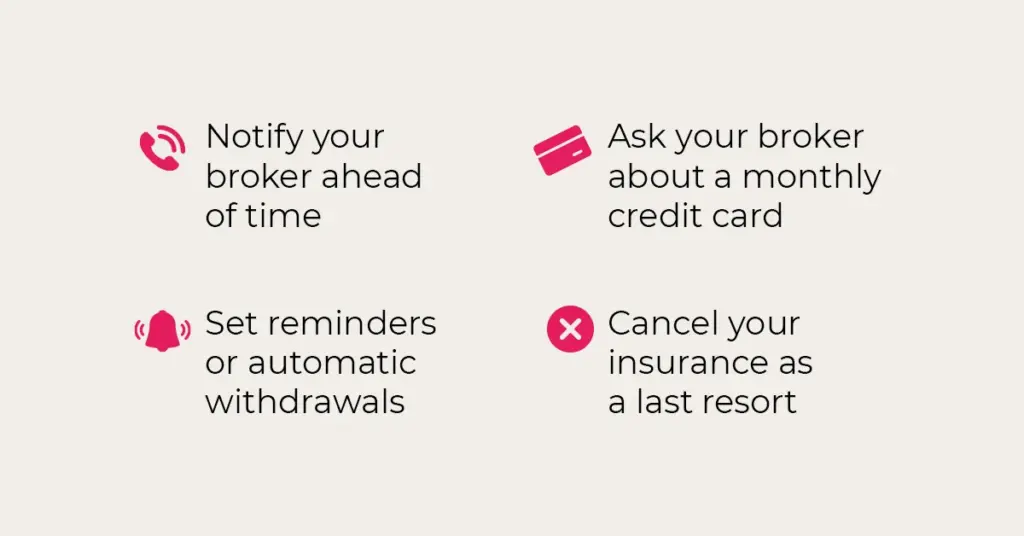Household financial needs are becoming increasingly difficult to meet for many people. According to StatsCan, one in four Canadians are currently struggling to make ends meet. With the rising costs for housing, food, and other necessities, some families are finding themselves in tough places and having to choose which bills they can afford to pay each month.
What about insurance? At Mitch, the number of clients missing insurance payments (and who are at risk of losing their policies) rose 6% between 2022 and 2023 and has increased 104% since 2019.
What happens if you miss an insurance payment?
Year-over-year increases in cancellation notifications
If you miss making multiple insurance payments, odds are that your policy will be cancelled. Before this happens, your insurer will warn you of the missed payment. They will do so via a registered letter (or email, for policyholders who chose to receive documents virtually). This notice will inform you of the kind of action they’re looking to take. We advise being proactive during this time and contacting your broker or insurer if you know you are currently having financial difficulties.
Over the past few years, we’ve seen a significant uptick at Mitch in cancellation notifications for non-payment. Here’s an overview of the non-payment cancellation notifications we’ve received from 2019 – 2023:
| Jan | Feb | Mar | Apr | May | Jun | Jul | Aug | Sep | Oct | Nov | Dec | Total | |
|---|---|---|---|---|---|---|---|---|---|---|---|---|---|
| 2019 | 198 | 136 | 149 | 119 | 171 | 172 | 177 | 210 | 174 | 195 | 152 | 151 | 2,004 |
| 2020 | 184 | 179 | 155 | 45 | 26 | 98 | 122 | 147 | 148 | 191 | 166 | 142 | 1,603 |
| 2021 | 174 | 117 | 173 | 177 | 122 | 156 | 201 | 212 | 254 | 204 | 221 | 256 | 2,267 |
| 2022 | 242 | 165 | 288 | 239 | 234 | 369 | 342 | 383 | 514 | 371 | 353 | 347 | 3,847 |
| 2023 | 389 | 328 | 422 | 323 | 334 | 413 | 365 | 372 | 353 | 211 | 287 | 282 | 4,079 |
| Total | 1,187 | 925 | 1,1817 | 903 | 887 | 1,208 | 1,207 | 1,324 | 1,443 | 1,172 | 1,179 | 1,178 | 13,800 |
| 1Data from Mitch Insurance | |||||||||||||
The difference between a missed payment and non-payment
Life can happen at inopportune moments, resulting in missed payments. Life happens at inopportune moments, sometimes resulting in missed payments. This can occur because of switching bank accounts, having an emergency, or simply forgetting to pay.
Following a missed insurance payment, most insurers will take the following steps:
- Send a notification making you aware of your missed payment
- Provide you with whatever grace period your policy terms may outline to make the payment
- Inform you of what will occur if you fail to make your payment before the grace period is up
Grace periods vary by insurer and can be 7 days, 15 days, 30 days, etc. It’s better to get in touch with your insurer as soon as you’ve missed an insurance payment (or even as soon as you feel you could miss an upcoming payment).
Non-payment is a serious issue and will result in having your insurance coverage cancelled. This happens usually after two missed payments, during which time you received a missed payment notice but still failed to remedy the issue. Following your failure to remedy the non-payment after two notices, you will receive a registered letter (either via mail or virtually, depending on if you chose to go paperless) and your policy will be cancelled. Note that once you are cancelled and switch to a new provider, what you owe to your previous insurance company will still need to be paid. Failure to pay this will be sent to collections and can end up impacting your credit rating, plus your new company may not be willing to insure you until your debt has been settled.
How does a cancellation affect your insurance?
Having an insurer decide to cancel your policy and you choosing to cancel your coverage are two very different things with extremely different future implications. The former, when due to non-payment, has severe insurance implications and will significantly decrease your options when it comes to getting insured again.
Mitch works with over 70 different insurance companies which we can comparison shop between for you when you request a quote. When you have a non-payment for cancellation on your insurance record, it narrows down the number of insurers we can shop from to four or five.
From those few insurance companies that will offer you coverage, all of them are going to be more expensive (as is the nature of now being “high-risk”) – high-risk insurance premiums can sometimes be double or even triple the cost – and the non-payment cancellation will remain on your insurance record for up to three years after the fact. Missing any bill is a big deal, and yes, missed payments for your phone bill or even your rent will result in cancellation or eviction, but it won’t increase those costs for the future. Being cancelled due to non-payment for insurance will impact your insurance for years after.
What’s more is that with those few insurance companies available to you, your payment options may become limited. Prior to a cancellation for non-payment, you would have had the choice for monthly payments. But a person cancelled due to non-payment may only have the option to pay for their entire policy upfront. Suddenly, that missed $200 payment becomes a $2,400 one – and it’s due immediately.
Beyond future insurance rates
A cancellation can have more implications than solely raising your insurance rates and/or limiting your payment options. Being cancelled on your auto insurance means you can’t drive until you have secured new coverage. In Canada, driving without auto insurance is illegal.
What about home insurance? It’s not legally required to carry home insurance in Canada. But if you’ve gone through a lender to buy your home, odds are you’ll be required to carry insurance. Having your policy cancelled may void your mortgage contract and could potentially result in a default on your home.
Why does cancellation for non-payment increase your insurance premiums?
Insurers may tend to price policyholders who have a history of being cancelled due to non-payment higher than those who haven’t due to an association with the likelihood of making a claim. Interestingly, there’s a stronger correlation between non-payment and making future claims than there is between having a prior accident or speeding ticket and making a claim.
With non-payment cancellations, your rates increase because now you’re a different category of policyholder, with your history of non-payment serving as an indicator of your increased likelihood of making a claim.
What to do if you think you’re going to miss an insurance payment:
If you are finding yourself in a situation where you think you might miss a monthly payment on your home, auto, condo, tenant, or another type of insurance policy, there’s a few things you can do. As always, it’s better to be proactive than reactive. If you’ve waited until your insurer sends a non-payment cancellation notice, and it’s 15 days or less before that date, there’s likely nothing that can be done to avoid cancellation.
Here’s some tips if you’re worried about missing an upcoming payment:
1. Notify your broker if a payment won’t clear
As soon as you think you might miss an insurance payment, or the account that your premiums are paid through contains insufficient funds, contact your broker or provider. They may be able to suggest ways to help you out in the meantime, such as deferring your payment. Not all insurers offer this option, but it’s worth a call. Keep in mind that most insurance companies require at least 15 days’ notice to defer a payment date.
Something else we recommend is ensuring you have overdraft protection on your bank account, so even if you’re off by a few dollars, your payment will still clear.
2. Ask your broker if your insurer offers a monthly credit card
Some insurers will offer relief in the form of a monthly credit card, which provides you a bit of a buffer should a payment date precede the date when you receive your typical income deposit. Not all insurance companies do this, however. Consider asking about this option when notifying your broker or insurer about the missed payment.
3. Set up automatic reminders or sign up for automatic withdrawals
What’s worse than being cancelled for non-payment due to insufficient funds is being cancelled simply because you forgot to make your payment. Consider setting up reminder notices on your phone or sign up to have the funds automatically withdrawn from your bank account.
4. Cancel your insurance
This isn’t always an option. Many people need their vehicles to commute to work and need their home insurance to avoid defaulting on their mortgage. But, if worse comes to worse and you can forgo your car insurance for a few months and opt for public transport instead, or even reduce your coverage to just comprehensive, it’s a lot better than getting cancelled due to non-payment. This is a last-case scenario, and although we would never ordinarily recommend anyone to cancel their policy mid-term, it can be a better alternative to being cancelled. You won’t face the same future rate or eligibility implications for cancelling your own policy.

We recommend talking to a broker before taking this route. It’s important to explore all other options to maintain your coverage before cancelling your insurance.
Thanks to Mitch Insurance’s Andrew Duncan, Director of Sales and Lead Generation, and Jesica Ryzynski, registered insurance broker since 1997, for their input on this post.








